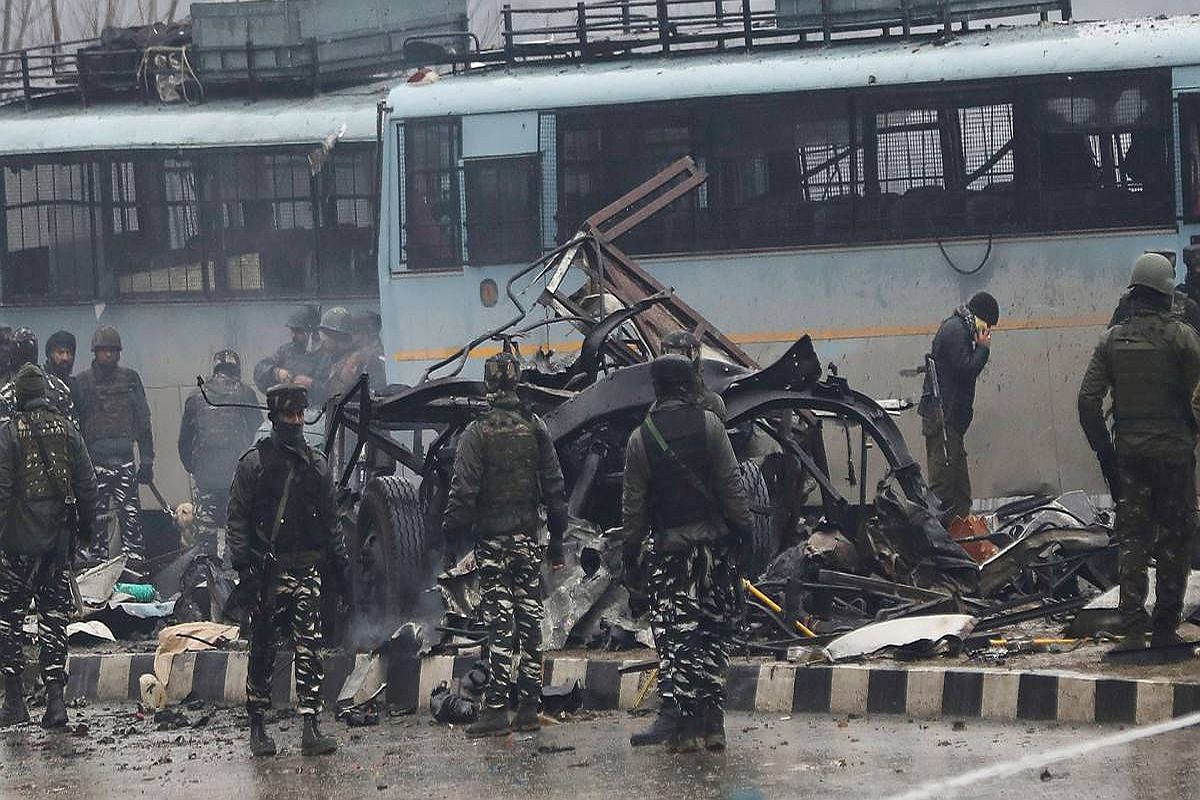Congress committing dacoity on rights of OBCs, SCs, STs: PM
“Wherever it (Congress) can do it, it will try to loot the claims of the SCs, STs and OBCs and give them to others,” said Modi.
Pakistan also claimed that there are no links to nail 54 people detained in connection with the Pulwama terror attack.

Security forces personnel inspect the remains of a vehicle following the attack on a CRPF convoy that killed at least 44 troopers and injured several others in Lethpora area Pulwama on February 14. (Photo: AFP)
Pakistan on Thursday said it has examined 22 “pin locations” shared by India but found no terror camps and claimed that there are no links to nail 54 people detained in connection with the Pulwama terror attack as it shared the “preliminary findings” with New Delhi.
Pakistan is willing to allow visits, on request, to these locations, the Foreign Office (FO) said in a statement.
“While 54 detained individuals are being investigated, no details linking them to Pulwama have been found so far,” it said. “Similarly, the 22 pin locations shared by India have been examined. No such camps exist. Pakistan is willing to allow visits, on request, to these locations,” the FO said.
Advertisement
It said that inconsistent with its commitment to cooperate, Pakistan on Wednesday shared “preliminary findings” of its investigations with India along with a set of questions.
“Subsequently, the diplomatic corps in Islamabad was briefed as well,” the FO said.
Indian High Commissioner Ajay Bisaria was called to the Ministry of Foreign Affairs in Islamabad by Pakistan Foreign Secretary Tehmina Janjua and the findings on the Pulwama incident were shared with him, the Pakistan foreign office said in a press release which was shared with the Indian media too.
It said Pakistan Prime Minister Imran Khan had offered cooperation in the investigation if credible evidence was provided by India. In response to this offer, a ‘paper’ was handed over to Pakistan on 27 February, the release added.
Pakistan has acted with a high sense of responsibility and extended full cooperation. “We do so in the interest of regional peace and security. We have sought further information/evidence from India to take the process forward,” it added.
The FO said soon after receiving the dossier, Pakistan constituted an investigation team, detained a number of people for investigation and initiated work on the technical aspects of social media content, a main basis of the Indian documents.
The Indian dossier contains 91 pages and six parts, out of which only part two and three pertain to the Pulwama attack, it said. “Other parts are generalised allegations. Pakistan is focusing on those parts which relate to Pulwama incident,” it said.
The FO claimed that during the course of investigations, all aspects of the information provided by India have been thoroughly examined including the “confessional” video of Adil Dar, “claim” of responsibility for the attack, Whatsapp and Telegram numbers used to share videos and messages in support of the Pulwama attack, list of 90 individuals suspected of belonging to a proscribed organisation and 22 pin locations of alleged training camps.
Service Providers have been requested for data including relevant details of activities and contacts of the GSM (Global System for Mobile communications) number provided by India, it said.
A request for assistance from Whatsapp has also been made to the US government, it said, adding that the said additional information and documents from India would be essential to continue the process of investigations.
“Pakistan remains committed to taking this process to its logical conclusion,” the FO added.
Tensions escalated after over 44 CRPF personnel were killed and many injured on February 14 in one of the deadliest terror strikes in Jammu-Kashmir when a Jaish-e-Mohammad (JeM) suicide bomber blew up an explosive-laden vehicle near their bus in Pulwama district.
India had given a dossier to Pakistan, providing comprehensive evidence about the involvement of JeM in the attack.
Following this, India carried out “non-military pre-emptive” airstrikes targeting the JeM training camp in Balakot in Pakistan’s restive Khyber Pakhtunkhwa province, about 80-km from the Line of Control (LoC) early on February 26.
The next day, Pakistan Air Force retaliated and downed a MiG-21 in an aerial combat and captured its pilot, who was handed over to India on March 1.
Following immense global pressure to rein in terror groups, Pakistan had earlier announced that it had taken control of 182 madrassas and detained more than 100 people as part of its crackdown on banned terror groups.
The Pakistan government had reportedly arrested the brother and son of JeM chief Masood Azhar along with 42 others affiliated with the banned terror groups.
(With agency inputs)
Advertisement